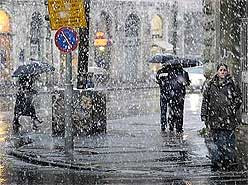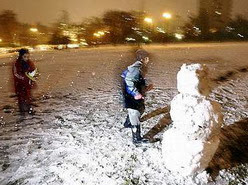 (Ramsay Clark defending Saddam Hussein at his trial for crimes against humanity - cartoon lifted from Slate.com).
(Ramsay Clark defending Saddam Hussein at his trial for crimes against humanity - cartoon lifted from Slate.com).In the last couple of days I've gotten a lot of referrals for people looking for information about Ramsay Clark. I would guess that this is because of the posting of Saddam Hussein's letter on the internet. The letter, written in response to his death sentence, apparently refers to those who supported him, including Clark, who was on his defense team.
Clark is also noted for defending others accused of crimes against humanity and genocide - for example, he defended Elizaphan Ntakirutimana, a Seventh-Day Adventist minister who was convicted of involvement in the Rwandan genocide. A Feb. 20, 2003 New York Times article provides more information:
A Protestant clergyman and his son, a physician, were convicted yesterday of genocide and sentenced to prison by the United Nations tribunal dealing with the Rwandan killing frenzy of 1994, in which members of Hutu gangs killed an estimated 800,000 minority Tutsi and moderate Hutu over three months.
The Rev. Elizaphan Ntakirutimana, 78, the former head of the Seventh-day Adventist Church in western Rwanda, was sentenced to 10 years in prison for aiding and abetting genocide. His son, Dr. Gérard Ntakirutimana, 45, who worked at the church's hospital, received a total sentence of 25 years for the same charges and for shooting two people to death.
With the verdict, Mr. Ntakirutimana became the first clergyman to be convicted of genocide by an international tribunal....
The three judges, led by Eric Mose of Norway, found that the pastor and his son had led attackers to the Mugonero Adventist church and hospital complex in Kibuye, where hundreds of unarmed Tutsi families, including Adventist ministers and their relatives, had sought refuge from the violence. The judges found that father and son also joined and guided vehicle convoys carrying attackers to nearby towns.
The judges, who dismissed other charges against the two, said that during the attacks, the physician had shot one man at close range in the hospital courtyard and another who had taken refuge at a school. ''As a medical doctor, he took lives instead of saving them,'' Judge Mose said in the court's summary.
Ramsey Clark, the former United States attorney general, who was defense counsel for the elder Mr. Ntakirutimana, called the verdict ''a tragic miscarriage of justice.'' He said both men would appeal.
The clergyman's case first gained attention in March 2000, when he became the first person handed over by the United States to an international tribunal....
Mr. Ntakirutimana is not the first member of the clergy to be held on genocide charges. Church workers, including two Catholic priests, have been convicted by local courts in Rwanda. In Belgium, two Rwandan nuns received long prison sentences for crimes against humanity for collaborating with Hutu militias.
But this case became known above all because of the astonishing letter that six Tutsi pastors wrote to him while they were at the church compound caring for refugees. The letter begged him for help, saying, ''We wish to inform you that we have heard that tomorrow we will be killed with our families.'' The group was indeed killed. During the trial, the letter was used as a prosecution exhibit. A witness, the son of one of the six clergymen, said the letter had received a cold reply saying nothing could be done.
While those accused of crimes against humanity and genocide also deserve competent legal counsel, Clark's wholehearted partisanship for those accused of such crimes is a revolting spectacle.
A statement issued by his office on November 29, 1996 on the International Tribune for Rwanda explains something of his enthusiasm for these cases:
Excerpts From A Statement On The International Tribunal For Rwanda
The International Tribunal for Rwanda is an extension of colonial power in Africa, which can threaten every African leader. There was never such a court during the colonial wars in Africa which could punish European powers for atrocities against the African people, or against apartheid leadership in South Africa; or the U.S. for its aggressions in Vietnam, Cambodia, Grenada, Libya, Panama, or Iraq, or the U.S.S.R., or Russian Federation in Afghanistan, Chechnya, East Europe, or the Baltic states.
The Tribunal is foreign power intervention taking sides to maintain its control over the majority Hutu through Tutsi surrogates. No country should surrender an accused to such a Tribunal until it is a permanent court that will deal equally and fairly in all cases worldwide against the powerful not only the weak, and act on truth alone, not political interest. The International Herald Tribune on November 23-24 reported on the slaughter of 298 Hutus in a Seventh Day Adventist Church after their return from the exile abroad. This Tribunal cannot protect these Hutus, or tens of thousands of others. Do the rich and powerful countries really believe they can do justice, or help Africa by prosecuting a select few while arming all sides to kill Africans and millions of Africans face starvation? It is their earlier interventions that have created these conditions.
Ramsey Clark, November 29, 1996
In response to these sentiments, Ken Harrow of Amnesty International wrote:
What an irony that Ramsey Clark would evoke the weak and the helpless in his defense of a man accused of genocide, would turn the blame outside Africa to absolve one who might well have assumed the guilt for the worst of crimes. Africa does not need any more defenders whose defense functions to deny Africa agency, responsibility for actions committed by Africans. It does not need Westerners to tell it that the powerful West is only and always responsible for crimes committed in Africa. The really weak and helpless victim here is justice, and the International Court is the first modest attempt to extend the concept of justice beyond national borders. Considering the crimes of our century committed by xenophobic nationalists, and the continuing crimes committed in the name of national interest, it is time for enlightened people to throw their support to international institutions based on premises of equity. ken harrow






